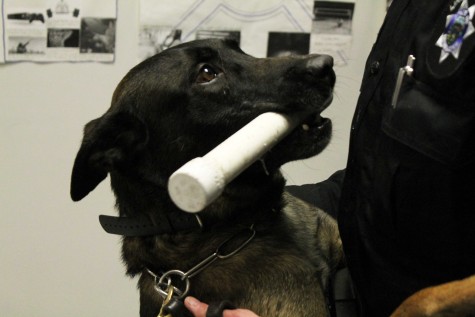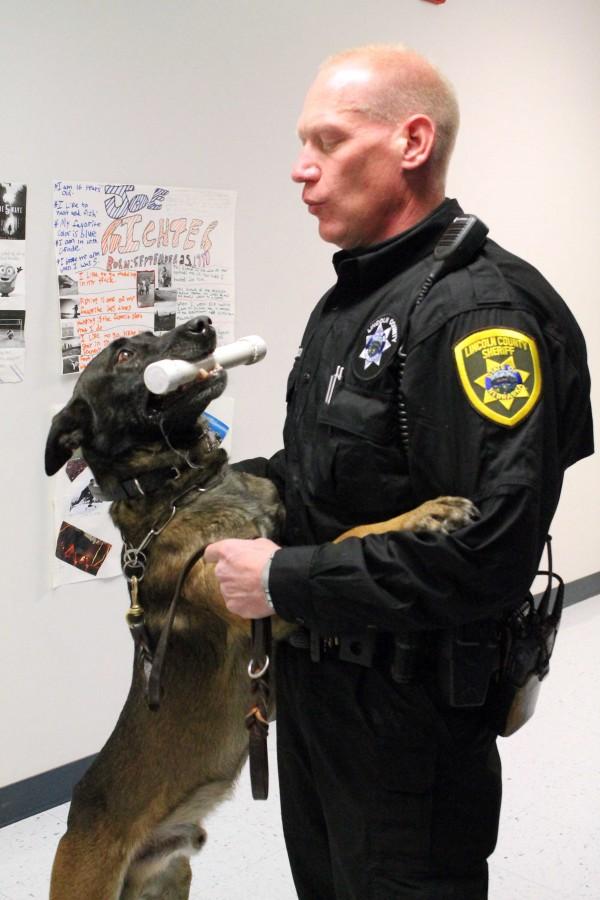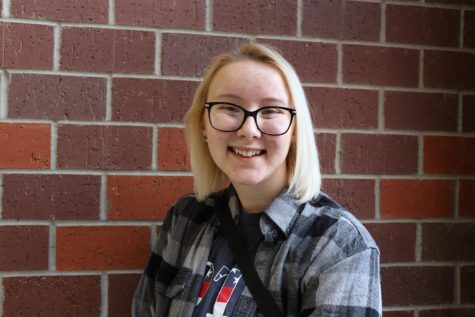Who let the (police) dogs out?
K-9 Ziego and his owner, Lincoln County Sheriff Deputy Jeff Gaasch share a bond for an effective partnership.
Two feet tall, 70 pounds of pure muscle, a sense of smell 10,000 times better than a human’s, and a tongue that could lick you to death? This is a spot-on description of police dog Zeigo, a 7-year-old Belgian Malinois, who assisted with the drug bust on November 10 at North Platte High School.
“The smallest find Zeigo has had was one marijuana seed found in a car,” said Deputy Jeff Gaasch of the Lincoln County Sheriff’s Office K-9 unit. Zeigo lives at home with Gaasch and his three children. As a working-dog, he is kept by Gaasch’s side or in a kennel, and his children don’t play with Zeigo the same way they do with their other dog.
Zeigo acts like a normal dog at home, but he knows the difference between work and play. “As soon as he sees the uniform on, he has a complete switch in personality,” said Gaasch.
Gaasch wanted a police dog so badly, he personally raised the $16,000 to get Zeigo. He sent letters to civic organizations; the Eagles Club donated $10,000. In total, it took three months to raise. The money covered the initial cost of the dog and his eight-week training class.
Gaasch claims the money was well-worth it, though, “In the five years we have had Zeigo, we’ve brought in just under $1 million in drug busts and cash,” he said. In the first three months of this year, they brought in $46,000 in drug-tainted cash.
The authorities get to keep the money. 80 percent of the money goes to the agency that found it, while 20 percent goes to the Federal government. The money can only be used for training and equipment.
Zeigo trains for eight hours every other week with Gaasch. ”There is a lot of upkeep and hours of training; you have to maintain him,” said Gaasch. There are three types of police dogs: explosive detection, narcotic detection, and a dual purpose. Zeigo is the latter; he detects narcotics, finds other types of evidence, does tracking, and apprehends criminals.
K-9’s are trained to do their job passively or aggressively. Zeigo is passive, so if a criminal were to run, but comply with Gaasch, he would lay down and bark. If the criminal were to run, fight, and/or not comply with the deputy, Ziego would take him down with a bite to his tricep and wrap all four legs around the suspect. “The dogs are trained to not release a criminal from their hold, even if the criminal is punching and hitting them,” said Gaasch.
The deputy can end a pursuit by verbal command, but Zeigo wears an electric shock training collar (e-collar) in case animalistic instinct takes over, so Gaasch can stop him for sure. Gaasch hasn’t had to use it yet, “[Zeigo] doesn’t like to disappoint dad,” he said.

Zeigo enjoys his reward and attention after altering his owner, LCSO Jeff Gaasch, about marijuana in a locker during a training exercise at NPHS.
The dogs have such an acute sense of smell, they have never been wrong when noticing something illegal. Anytime Zeigo indicates a spot to Gaasch, that may not necessarily mean that there are drugs there, but there was at some point.
Police dog’s noses are so sensitive, they smell the residue of drugs left over on objects and will bark. “If a pizza is baked, we smell pizza, but a dog smells every ingredient and can identify each one individually. It’s the same with drugs,” said School Resource Officer J. Johnson.
Searching North Platte High School is a free service to the district, and serves as training for the dogs. On November 3, there were no drugs found within the school, but seven lockers were alerted by the dogs, meaning drugs were present in them at one point. Four vehicles were indicated and three had drugs present, “It was obvious drugs and alcohol were present in the fourth shortly before the search,” said Gaasch.
To administration, there is no difference between drugs in the parking lot or in the school itself. Johnson said the search was successful meaning drugs were found. “If we can stop it now and be preventative, we will,” said Johnson. “The search from [Nov. 10] shows that another search will be warranted soon.”



Emilee Gibson • Jan 6, 2016 at 11:42 AM
This story was an amazing glimpse at the qualities in a police dog. It was very thorough and thought out well. The explanations to the frequently asked questions about police dogs were answered in an amazing manner.
Kaitlyn Baker • Dec 4, 2015 at 1:04 PM
This was an awesome look behind the scenes for police dogs and what happens when they are used. It was a very interesting story with a great topic.
Jacob • Dec 4, 2015 at 12:57 PM
I think that its pretty cool to have a dog that can do what this dog can do.